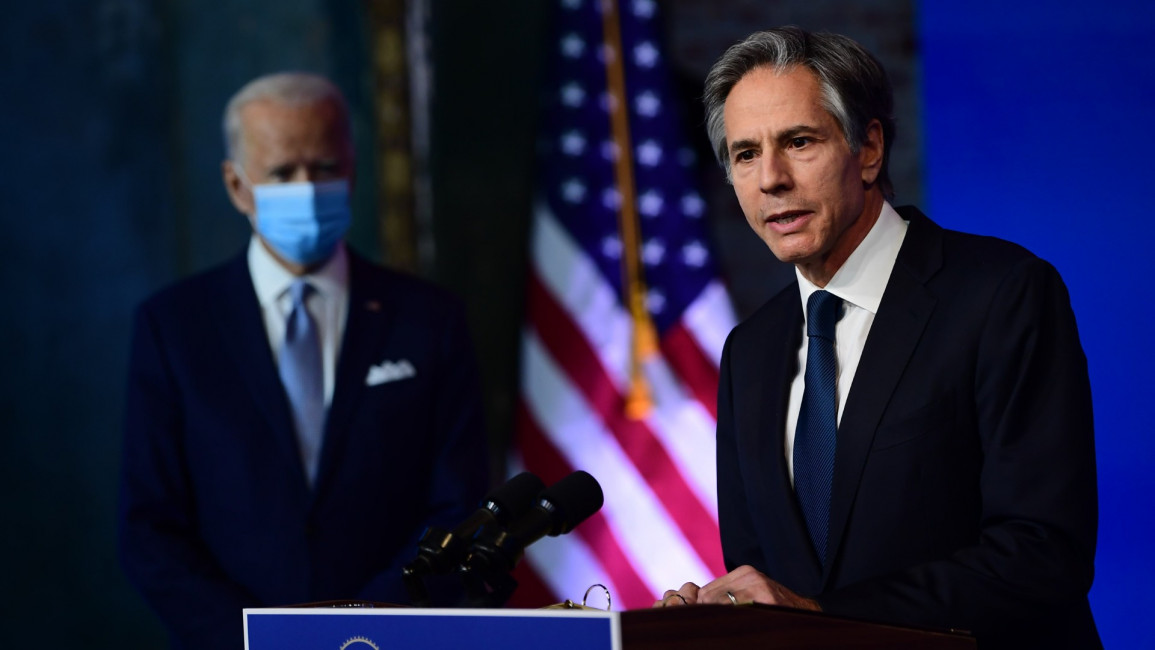
Tony Blinken: the good, the bad, and potentially ugly
President-elect Biden has chosen his longtime foreign policy adviser Antony Blinken as his nominee for Secretary of State.
Blinken had previously served as Biden's national security advisor when Biden was vice president, and he was also deputy secretary of state in the Obama administration. It was always a given that Blinken would be receiving one of the top jobs on Biden's national security team, and the president-elect announced his choice for repairing the State Department on Tuesday.
Blinken is a respected, credentialed member of the Democratic Party's foreign policy establishment, and his record is accordingly mixed. While advocates of restraint will find a few cautiously hopeful notes in his appointment, there are other things that should give us pause.
Like Biden, Blinken has been and remains a strong supporter of the Joint Comprehensive Plan of Action (JCPOA), the 2015 nonproliferation agreement that restricted Iran's nuclear programme that was by most accounts successful until President Trump withdrew from the pact two years ago.
Blinken has said that a Biden administration would reenter the deal as the basis for pursuing a follow-on agreement with Iran. He also supports extending the New START treaty with Russia that would cap and reduce our respective nuclear stockpiles, so his appointment is a positive signal that the Biden administration will keep the remaining arms control treaty alive for the next five years.
 |
He will be in a good position to repair many of the relationships that were fractured by Mike Pompeo's reckless swaggering |  |
Blinken is respected internationally, and he will be in a good position to repair many of the relationships that were fractured by Mike Pompeo's reckless swaggering. It will be refreshing to have a secretary of state who values the work of the department he will be leading instead of working overtime to wreck it and demoralize its diplomats as Pompeo has done. Insofar as repairing and rejuvenating the State Department will be one of the main tasks for the next secretary, Blinken is eminently qualified to do it.
When it comes to questions of military intervention, Blinken's record is much less reassuring. According to journalists Robert Wright and Connor Echols, who have created a system for grading Biden's possible appointees against a standard of progressive realism, Blinken's support for military restraint has been quite poor.
Twitter Post
|
Blinken maintains that the failure of US policy in Syria was that our government did not employ enough force. He stands by the false argument that Biden's vote to authorise the invasion of Iraq was a "vote for tough diplomacy". He was reportedly in favour of the Libyan intervention, which Biden opposed, and he was initially a defender and advocate for US support for the Saudi coalition war on Yemen.
In short, Blinken has agreed with some of the biggest foreign policy mistakes that Biden and Obama made, and he has tended to be more of an interventionist than both of them.
Read more: What a Biden presidency means for US ties with Israel
The war on Yemen is an important example of how Blinken started off with a terrible position, but seems to have learned from that mistake. In 2015, Blinken was defending the Obama administration's disastrous decision to back the intervention in Yemen. Like many other former Obama officials, Blinken has changed his view of the policy that Obama started.
More recently, he was one of many leading former Obama administration officials to sign a letter in 2018 in support of the effort to end US involvement in the war. Biden has pledged to end US support for the Saudi coalition, and together with Blinken's changed position, it suggests that there is good reason to expect that this will happen early in the new year. Yemen will be the most important early test to determine whether Biden and Blinken can make a clean break with the errors of both the Obama and Trump administrations.
While there are encouraging signs that a Biden administration will undo some of the outgoing administration's more harmful policies, Biden and Blinken remain wedded to an overly ambitious and costly strategy of primacy, however. When Blinken co-wrote an article with Robert Kagan in early 2019, he dismissed alternative foreign policy visions that called for the United States to scale back its role in the world. They blow off arguments for restraint on the grounds that it would repeat the errors of the 1930s.
 |
Yemen will be the most important early test to determine whether Biden and Blinken can make a clean break with the errors of both the Obama and Trump administrations |  |
On the issue of Syria, Blinken and Kagan asserted that the United States "made the opposite error of doing too little." That is a disturbingly hard-line interventionist view to hold so many years after the war in Syria began. They called for the "judicious use of force," but it seems impossible to square that with a belief that Washington should have intervened more forcefully in the Syrian nightmare. If a similar crisis occurs in the coming years, it seems likely that Blinken will be among those urging Biden to use force.
There is no question that having Blinken as secretary of state will be a huge improvement over the current occupant of that office. After four years of demoralisation and terrible leadership, the department can begin to recover from the damage that has been done to it. It's also clear that Blinken was a better choice than some of the others that Biden could have picked. Advocates of restraint may find Blinken to be receptive to some of our arguments on certain issues, but we should also be prepared to hold him accountable if he endorses more misguided interventions in conflicts where the US has no vital interests.
Daniel Larison is a senior editor at The American Conservative magazine. He has a PhD in History from the University of Chicago.
Follow him on Twitter @DanielLarison
This article was originally published by our friends at Responsible Statecraft.
Opinions expressed in this article remain those of the author and do not necessarily represent those of The New Arab, its editorial board or staff.




